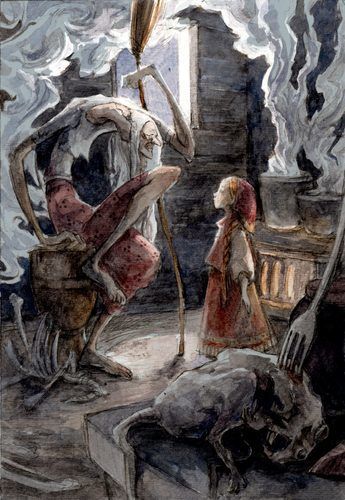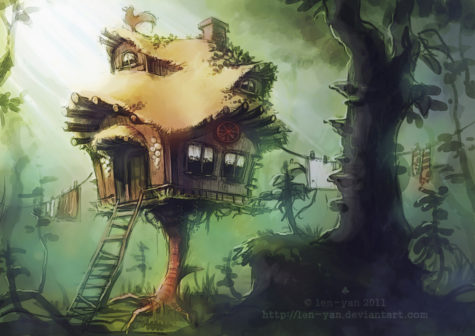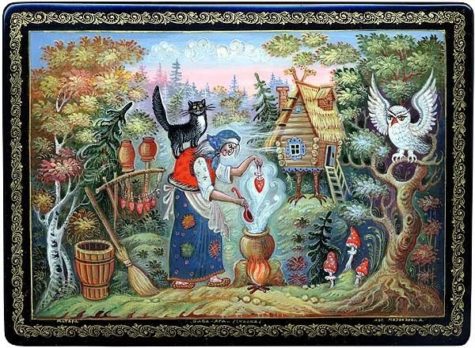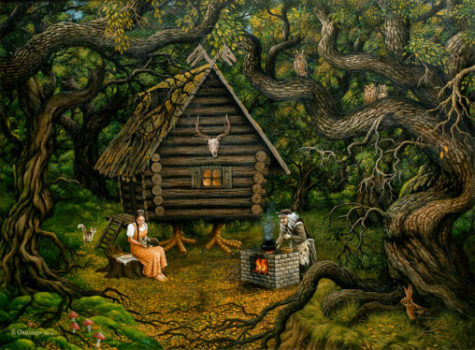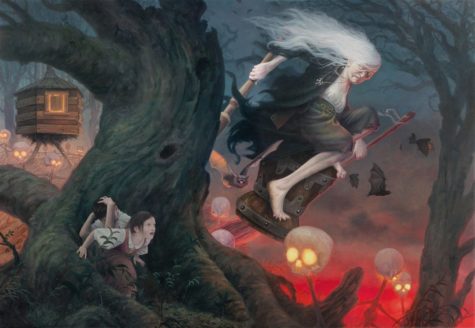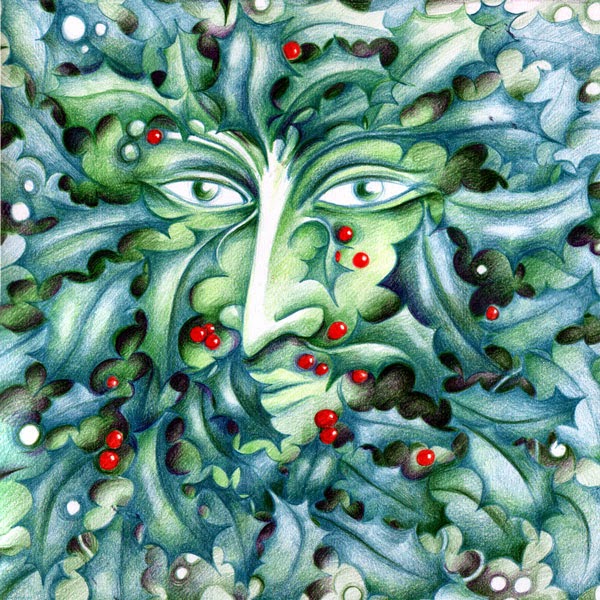Russia
An Improved Baba Yaga Story
From Old Peter’s Russian Tales by Arthur Ransome we have an improved version of the fairy tale about Baba Yaga and the Little Girl.
“Tell us about Baba Yaga,” begged Maroosia.
“Yes,” said Vanya, “please, grandfather, and about the little hut on hen’s legs.”
“Baba Yaga is a witch,” said old Peter; “a terrible old woman she is, but sometimes kind enough. You know it was she who told Prince Ivan how to win one of the daughters of the Tzar of the Sea, and that was the best daughter of the bunch, Vasilissa the Very Wise. But then Baba Yaga is usually bad, as in the case of Vasilissa the Very Beautiful, who was only saved from her iron teeth by the cleverness of her Magic Doll.”
“Tell us the story of the Magic Doll,” begged Maroosia.
“I will some day,” said old Peter.
“And has Baba Yaga really got iron teeth?” asked Vanya.
“Iron, like the poker and tongs,” said old Peter.
“What for?” said Maroosia.
“To eat up little Russian children,” said old Peter, “when she can get them. She usually only eats bad ones, because the good ones get away. She is bony all over, and her eyes flash, and she drives about in a mortar, beating it with a pestle, and sweeping up her tracks with a besom, so that you cannot tell which way she has gone.”
“And her hut?” said Vanya. He had often heard about it before, but he wanted to hear about it again.
“She lives in a little hut which stands on hen’s legs. Sometimes it faces the forest, sometimes it faces the path, and sometimes it walks solemnly about. But in some of the stories she lives in another kind of hut, with a railing of tall sticks, and a skull on each stick. And all night long fire glows in the skulls and fades as the dawn rises.”
“Now tell us one of the Baba Yaga stories,” said Maroosia.
“Please,” said Vanya.
“I will tell you how one little girl got away from her, and then, if ever she catches you, you will know exactly what to do.”
And old Peter put down his pipe and began:—
Baba Yaga and the Little Girl with the Kind Heart
Once upon a time there was a widowed old man who lived alone in a hut with his little daughter. Very merry they were together, and they used to smile at each other over a table just piled with bread and jam. Everything went well, until the old man took it into his head to marry again.
Yes, the old man became foolish in the years of his old age, and he took another wife. And so the poor little girl had a stepmother. And after that everything changed. There was no more bread and jam on the table, and no more playing bo-peep, first this side of the samovar and then that, as she sat with her father at tea.
It was worse than that, for she never did sit at tea. The stepmother said that everything that went wrong was the little girl’s fault. And the old man believed his new wife, and so there were no more kind words for his little daughter. Day after day the stepmother used to say that the little girl was too naughty to sit at table. And then she would throw her a crust and tell her to get out of the hut and go and eat it somewhere else.
And the poor little girl used to go away by herself into the shed in the yard, and wet the dry crust with her tears, and eat it all alone. Ah me! she often wept for the old days, and she often wept at the thought of the days that were to come.
Mostly she wept because she was all alone, until one day she found a little friend in the shed. She was hunched up in a corner of the shed, eating her crust and crying bitterly, when she heard a little noise. It was like this: scratch—scratch. It was just that, a little gray mouse who lived in a hole.
Out he came, his little pointed nose and his long whiskers, his little round ears and his bright eyes. Out came his little humpy body and his long tail. And then he sat up on his hind legs, and curled his tail twice round himself and looked at the little girl.
The little girl, who had a kind heart, forgot all her sorrows, and took a scrap of her crust and threw it to the little mouse. The mouseykin nibbled and nibbled, and there, it was gone, and he was looking for another. She gave him another bit, and presently that was gone, and another and another, until there was no crust left for the little girl. Well, she didn’t mind that. You see, she was so happy seeing the little mouse nibbling and nibbling.
When the crust was done the mouseykin looks up at her with his little bright eyes, and “Thank you,” he says, in a little squeaky voice. “Thank you,” he says; “you are a kind little girl, and I am only a mouse, and I’ve eaten all your crust. But there is one thing I can do for you, and that is to tell you to take care. The old woman in the hut (and that was the cruel stepmother) is own sister to Baba Yaga, the bony-legged, the witch. So if ever she sends you on a message to your aunt, you come and tell me. For Baba Yaga would eat you soon enough with her iron teeth if you did not know what to do.”
“Oh, thank you,” said the little girl; and just then she heard the stepmother calling to her to come in and clean up the tea things, and tidy the house, and brush out the floor, and clean everybody’s boots.
So off she had to go.
When she went in she had a good look at her stepmother, and sure enough she had a long nose, and she was as bony as a fish with all the flesh picked off, and the little girl thought of Baba Yaga and shivered, though she did not feel so bad when she remembered the mouseykin out there in the shed in the yard.
The very next morning it happened. The old man went off to pay a visit to some friends of his in the next village, just as I go off sometimes to see old Fedor, God be with him. And as soon as the old man was out of sight the wicked stepmother called the little girl.
“You are to go to-day to your dear little aunt in the forest,” says she, “and ask her for a needle and thread to mend a shirt.”
“But here is a needle and thread,” says the little girl.
“Hold your tongue,” says the stepmother, and she gnashes her teeth, and they make a noise like clattering tongs. “Hold your tongue,” she says. “Didn’t I tell you you are to go to-day to your dear little aunt to ask for a needle and thread to mend a shirt?”
“How shall I find her?” says the little girl, nearly ready to cry, for she knew that her aunt was Baba Yaga, the bony-legged, the witch.
The stepmother took hold of the little girl’s nose and pinched it.
“That is your nose,” she says. “Can you feel it?”
“Yes,” says the poor little girl.
“You must go along the road into the forest till you come to a fallen tree; then you must turn to your left, and then follow your nose and you will find her,” says the stepmother. “Now, be off with you, lazy one. Here is some food for you to eat by the way.” She gave the little girl a bundle wrapped up in a towel.
The little girl wanted to go into the shed to tell the mouseykin she was going to Baba Yaga, and to ask what she should do. But she looked back, and there was the stepmother at the door watching her. So she had to go straight on.
She walked along the road through the forest till she came to the fallen tree. Then she turned to the left. Her nose was still hurting where the stepmother had pinched it, so she knew she had to go straight ahead. She was just setting out when she heard a little noise under the fallen tree. “Scratch—scratch.”
And out jumped the little mouse, and sat up in the road in front of her.
“O mouseykin, mouseykin,” says the little girl, “my stepmother has sent me to her sister. And that is Baba Yaga, the bony-legged, the witch, and I do not know what to do.”
“It will not be difficult,” says the little mouse, “because of your kind heart. Take all the things you find in the road, and do with them what you like. Then you will escape from Baba Yaga, and everything will be well.”
“Are you hungry, mouseykin?” said the little girl
“I could nibble, I think,” says the little mouse.
The little girl unfastened the towel, and there was nothing in it but stones. That was what the stepmother had given the little girl to eat by the way.
“Oh, I’m so sorry,” says the little girl. “There’s nothing for you to eat.”
“Isn’t there?” said mouseykin, and as she looked at them the little girl saw the stones turn to bread and jam. The little girl sat down on the fallen tree, and the little mouse sat beside her, and they ate bread and jam until they were not hungry any more.
“Keep the towel,” says the little mouse; “I think it will be useful. And remember what I said about the things you find on the way. And now good-bye,” says he.
“Good-bye,” says the little girl, and runs along.
As she was running along she found a nice new handkerchief lying in the road. She picked it up and took it with her. Then she found a little bottle of oil. She picked it up and took it with her. Then she found some scraps of meat.
“Perhaps I’d better take them too,” she said; and she took them.
Then she found a gay blue ribbon, and she took that. Then she found a little loaf of good bread, and she took that too.
“I daresay somebody will like it,” she said.
And then she came to the hut of Baba Yaga, the bony-legged, the witch. There was a high fence round it with big gates. When she pushed them open they squeaked miserably, as if it hurt them to move. The little girl was sorry for them.
“How lucky,” she says, “that I picked up the bottle of oil!” and she poured the oil into the hinges of the gates.
Inside the railing was Baba Yaga’s hut, and it stood on hen’s legs and walked about the yard. And in the yard there was standing Baba Yaga’s servant, and she was crying bitterly because of the tasks Baba Yaga set her to do. She was crying bitterly and wiping her eyes on her petticoat.
“How lucky,” says the little girl, “that I picked up a handkerchief!” And she gave the handkerchief to Baba Yaga’s servant, who wiped her eyes on it and smiled through her tears.
Close by the hut was a huge dog, very thin, gnawing a dry crust.
“How lucky,” says the little girl, “that I picked up a loaf!” And she gave the loaf to the dog, and he gobbled it up and licked his lips.
The little girl went bravely up to the hut and knocked on the door.
“Come in,” says Baba Yaga.
The little girl went in, and there was Baba Yaga, the bony-legged, the witch, sitting weaving at a loom. In a corner of the hut was a thin black cat watching a mouse-hole.
“Good-day to you, auntie,” says the little girl, trying not to tremble.
“Good-day to you, niece,” says Baba Yaga.
“My stepmother has sent me to you to ask for a needle and thread to mend a shirt.”
“Very well,” says Baba Yaga, smiling, and showing her iron teeth. “You sit down here at the loom, and go on with my weaving, while I go and get you the needle and thread.”
The little girl sat down at the loom and began to weave.
Baba Yaga went out and called to her servant, “Go, make the bath hot and scrub my niece. Scrub her clean. I’ll make a dainty meal of her.”
The servant came in for the jug. The little girl begged her, “Be not too quick in making the fire, and carry the water in a sieve.” The servant smiled, but said nothing, because she was afraid of Baba Yaga. But she took a very long time about getting the bath ready.
Baba Yaga came to the window and asked,—
“Are you weaving, little niece? Are you weaving, my pretty?”
“I am weaving, auntie,” says the little girl.
When Baba Yaga went away from the window, the little girl spoke to the thin black cat who was watching the mouse-hole.
“What are you doing, thin black cat?”
“Watching for a mouse,” says the thin black cat. “I haven’t had any dinner for three days.”
“How lucky,” says the little girl, “that I picked up the scraps of meat!” And she gave them to the thin black cat. The thin black cat gobbled them up, and said to the little girl,—
“Little girl, do you want to get out of this?”
“Catkin dear,” says the little girl, “I do want to get out of this, for Baba Yaga is going to eat me with her iron teeth.”
“Well,” says the cat, “I will help you.”
Just then Baba Yaga came to the window.
“Are you weaving, little niece?” she asked. “Are you weaving, my pretty?”
“I am weaving, auntie,” says the little girl, working away, while the loom went clickety clack, clickety clack.
Baba Yaga went away.
Says the thin black cat to the little girl: “You have a comb in your hair, and you have a towel. Take them and run for it while Baba Yaga is in the bath-house. When Baba Yaga chases after you, you must listen; and when she is close to you, throw away the towel, and it will turn into a big, wide river. It will take her a little time to get over that. But when she does, you must listen; and as soon as she is close to you throw away the comb, and it will sprout up into such a forest that she will never get through it at all.”
“But she’ll hear the loom stop,” says the little girl.
“I’ll see to that,” says the thin black cat.
The cat took the little girl’s place at the loom.
Clickety clack, clickety clack; the loom never stopped for a moment.
The little girl looked to see that Baba Yaga was in the bath-house, and then she jumped down from the little hut on hen’s legs, and ran to the gates as fast as her legs could flicker.
The big dog leapt up to tear her to pieces. Just as he was going to spring on her he saw who she was.
“Why, this is the little girl who gave me the loaf,” says he. “A good journey to you, little girl;” and he lay down again with his head between his paws.
When she came to the gates they opened quietly, quietly, without making any noise at all, because of the oil she had poured into their hinges.
Outside the gates there was a little birch tree that beat her in the eyes so that she could not go by.
“How lucky,” says the little girl, “that I picked up the ribbon!” And she tied up the birch tree with the pretty blue ribbon. And the birch tree was so pleased with the ribbon that it stood still, admiring itself, and let the little girl go by.
How she did run!
Meanwhile the thin black cat sat at the loom. Clickety clack, clickety clack, sang the loom; but you never saw such a tangle as the tangle made by the thin black cat.
And presently Baba Yaga came to the window.
“Are you weaving, little niece?” she asked. “Are you weaving, my pretty?”
“I am weaving, auntie,” says the thin black cat, tangling and tangling, while the loom went clickety clack, clickety clack.
“That’s not the voice of my little dinner,” says Baba Yaga, and she jumped into the hut, gnashing her iron teeth; and there was no little girl, but only the thin black cat, sitting at the loom, tangling and tangling the threads.
“Grr,” says Baba Yaga, and jumps for the cat, and begins banging it about. “Why didn’t you tear the little girl’s eyes out?”
“In all the years I have served you,” says the cat, “you have only given me one little bone; but the kind little girl gave me scraps of meat.”
Baba Yaga threw the cat into a corner, and went out into the yard.
“Why didn’t you squeak when she opened you?” she asked the gates.
“Why didn’t you tear her to pieces?” she asked the dog.
“Why didn’t you beat her in the face, and not let her go by?” she asked the birch tree.
“Why were you so long in getting the bath ready? If you had been quicker, she never would have got away,” said Baba Yaga to the servant.
And she rushed about the yard, beating them all, and scolding at the top of her voice.
Ah!” said the gates, “in all the years we have served you, you never even eased us with water; but the kind little girl poured good oil into our hinges.”
“Ah!” said the dog, “in all the years I’ve served you, you never threw me anything but burnt crusts; but the kind little girl gave me a good loaf.”
“Ah!” said the little birch tree, “in all the years I’ve served you, you never tied me up, even with thread; but the kind little girl tied me up with a gay blue ribbon.”
“Ah!” said the servant, “in all the years I’ve served you, you have never given me even a rag; but the kind little girl gave me a pretty handkerchief.”
Baba Yaga gnashed at them with her iron teeth. Then she jumped into the mortar and sat down. She drove it along with the pestle, and swept up her tracks with a besom, and flew off in pursuit of the little girl.
The little girl ran and ran. She put her ear to the ground and listened. Bang, bang, bangety bang! she could hear Baba Yaga beating the mortar with the pestle. Baba Yaga was quite close. There she was, beating with the pestle and sweeping with the besom, coming along the road.
There she was, beating with the pestle and sweeping with the besom.
As quickly as she could, the little girl took out the towel and threw it on the ground. And the towel grew bigger and bigger, and wetter and wetter, and there was a deep, broad river between Baba Yaga and the little girl.
The little girl turned and ran on. How she ran!
Baba Yaga came flying up in the mortar. But the mortar could not float in the river with Baba Yaga inside. She drove it in, but only got wet for her trouble. Tongs and pokers tumbling down a chimney are nothing to the noise she made as she gnashed her iron teeth. She turned home, and went flying back to the little hut on hen’s legs. Then she got together all her cattle and drove them to the river.
“Drink, drink!” she screamed at them; and the cattle drank up all the river to the last drop. And Baba Yaga, sitting in the mortar, drove it with the pestle, and swept up her tracks with the besom, and flew over the dry bed of the river and on in pursuit of the little girl.
The little girl put her ear to the ground and listened. Bang, bang, bangety bang! She could hear Baba Yaga beating the mortar with the pestle. Nearer and nearer came the noise, and there was Baba Yaga, beating with the pestle and sweeping with the besom, coming along the road close behind.
The little girl threw down the comb, and grew bigger and bigger, and its teeth sprouted up into a thick forest, thicker than this forest where we live—so thick that not even Baba Yaga could force her way through. And Baba Yaga, gnashing her teeth and screaming with rage and disappointment, turned round and drove away home to her little hut on hen’s legs.
The little girl ran on home. She was afraid to go in and see her stepmother, so she ran into the shed.
Scratch, scratch! Out came the little mouse.
“So you got away all right, my dear,” says the little mouse. “Now run in. Don’t be afraid. Your father is back, and you must tell him all about it.”
The little girl went into the house.
“Where have you been?” says her father; “and why are you so out of breath?”
The stepmother turned yellow when she saw her, and her eyes glowed, and her teeth ground together until they broke.
But the little girl was not afraid, and she went to her father and climbed on his knee, and told him everything just as it had happened. And when the old man knew that the stepmother had sent his little daughter to be eaten by Baba Yaga, he was so angry that he drove her out of the hut, and ever afterwards lived alone with the little girl. Much better it was for both of them.
“And the little mouse?” said Ivan.
“The little mouse,” said old Peter, “came and lived in the hut, and every day it used to sit up on the table and eat crumbs, and warm its paws on the little girl’s glass of tea.”
Baba Yaga and the Little Girl
Baba Yaga lived deep in the forest and scared passersby to death just by appearing to them. She then devoured Her victims, which is why Her picket fence was topped with skulls. Children’s stories about Baba Yaga tend to be quite similar. Here is a story about a little girl, her wicked stepmother, and Baba Yaga.
Once upon a time there was a man and woman who had an only daughter. When his wife died, the man took another. But the wicked stepmother took a dislike to the girl, beat her hard and wondered how to be rid of her forever. One day the father went off somewhere and the stepmother said to the girl, “Go to your aunt, to my sister, and ask her for a needle and thread to sew you a blouse.” The aunt was really Baba Yaga, the bony witch.
Now, the little girl was not stupid and she first went to her own aunt for advice. “Good morrow. Auntie,” she said. “Mother has sent me to her sister for a needle and thread to sew me a blouse. What should I do?”
The aunt told her what to do. “My dear niece,” she said. “You will find a birch-tree there that will lash your face; you must tie it with a ribbon. You will find gates that will creak and bang; you must pour oil on the hinges. You will find dogs that will try to rip you apart; you must throw them fresh rolls. You will find a cat that will try to scratch your eyes out; you must give her some ham.”
The little girl went off, walked and walked and finally came to the witch’s abode.
There stood a hut, and inside sat Baba Yaga, the bony witch, spinning. “Good day. Auntie,” said the little girl.
“Good day, dearie,” the witch replied.
“Mother sent me for a needle and thread to sew me a blouse,” said the girl.
“Very well,” Baba Yaga said. “Sit down and weave.”
The girl sat at the loom. then Baba Yaga went out and told her serving-maid, “Go and heat up the bath-house and give my niece a good wash; I want to eat her for breakfast.”
The serving-maid did as she was bid; and the poor little girl sat there half dead with fright, begging, “Oh, please, dear serving-maid, don’t bum the wood, pour water on instead, and carry the water in a sieve.” And she gave the maid a kerchief.
Meanwhile Baba Yaga was waiting; she went to the window and asked, “Are you weaving, dear niece? Are you weaving, my dear?”
“I’m weaving, Auntie,” the girl replied, “I’m weaving, my dear.”
When Baba Yaga moved away from the window, the little girl gave some ham to the cat and asked her whether there was any escape. At once the cat replied, “Here is a comb and towel. Take them and run away. Baba Yaga will chase you; put your ear to the ground and, when you hear her coming, throw down the towel?and a wide, wide river will appear. And if she crosses the river and starts to catch you up, put your ear to the ground again and, when you hear her coming close, throw down your comb and a dense forest will appear. She won’t be able to get through that.”
The little girl took the towel and comb and ran. As she ran from the house, the dogs tried to tear her to pieces, but she tossed them the fresh rolls and they let her pass. The gates tried to bang shut, but she poured some oil on the hinges, and they let her through. The birch-tree tried to lash her face, but she tied it with a ribbon, and it let her pass.
In the meantime, the cat sat down at the loom to weave?though, truth to tell, she tangled it all up instead. Now and then Baba Yaga would come to the window and call, “Are you weaving, dear niece? Are you weaving, my dear?” And the cat would answer in a low voice, “I’m weaving. Auntie. I’m weaving, my dear.”
The witch rushed into the hut and saw that the girl was gone. She gave the cat a good beating and scolded her for not scratching out the girl’s eyes. But the cat answered her, “I’ve served you for years, yet you’ve never even given me a bone, but she gave me some ham.”
Baba Yaga then turned on the dogs, the gates, the birch-tree and the serving-maid, and set to thrashing and scolding them all. But the dogs said to her, “We’ve served you for years, yet you’ve never even thrown us a burnt crust, but she gave us fresh rolls.”
And the gates said, “We’ve served you for years, yet you’ve never even poured water on our hinges, but she oiled them for us.”
And the birch-tree said, “I’ve served you for years, yet you’ve never even tied me up with thread, but she tied me with a ribbon.” And the serving-maid said, “I’ve served you for years, yet you’ve never even given me a rag, but she gave me a kerchief.”
From: Russian Fairy Tales
Baba Yaga and the Twins
Somewhere, I cannot tell you exactly where, but certainly in vast Russia, there lived a peasant with his wife and they had twins — a son and daughter. One day the wife died and the husband mourned over her very sincerely for a long time. One year passed, and two years, and even longer. But there is no order in a house without a woman, and a day came when the man thought, “If I marry again possibly it would turn out all right.” And so he did, and had children by his second wife.
The stepmother was envious of the stepson and daughter and began to use them hardly. She scolded them without any reason, sent them away from home as often as she wished, and gave them scarcely enough to eat. Finally she wanted to get rid of them altogether. Do you know what it means to allow a wicked thought to enter one’s heart?
The wicked thought grows all the time like a poisonous plant and slowly kills the good thoughts. A wicked feeling was growing in the stepmother’s heart, and she determined to send the children to the witch, thinking sure enough that they would never return.
“Dear children,” she said to the orphans, “go to my grandmother who lives in the forest in a hut on hen’s feet. You will do everything she wants you to, and she will give you sweet things to eat and you will be happy.”
The orphans started out. But instead of going to the witch, the sister, a bright little girl, took her brother by the hand and ran to their own old, old grandmother and told her all about their going to the forest.
“Oh, my poor darlings!” said the good old grandmother, pitying the children, “my heart aches for you, but it is not in my power to help you. You have to go not to a loving grandmother, but to a wicked witch. Now listen to me, my darlings,” she continued; “I will give you a hint: Be kind and good to every one; do not speak ill words to any one; do not despise helping the weakest, and always hope that for you, too, there will be the needed help.”
The good old grandmother gave the children some delicious fresh milk to drink and to each a big slice of ham. She also gave them some cookies—there are cookies everywhere—and when the children departed she stood looking after them a long, long time.
The obedient children arrived at the forest and, oh, wonder! there stood a hut, and what a curious one! It stood on tiny hen’s feet, and at the top was a rooster’s head. With their shrill, childish voices they called out loud: “Izboushka, Izboushka! turn thy back to the forest and thy front to us!”
The hut did as they commanded. The two orphans looked inside and saw the witch resting there, her head near the threshold, one foot in one corner, the other foot in another corner, and her knees quite close to the ridge pole.
“Fou, Fou, Fou!” exclaimed the witch; “I feel the Russian spirit.”
The children were afraid, and stood close, very close together, but in spite of their fear they said very politely: “Ho, grandmother, our stepmother sent us to thee to serve thee.”
“All right; I am not opposed to keeping you, children. If you satisfy all my wishes I shall reward you; if not, I shall eat you up.”
Without any delay the witch ordered the girl to spin the thread, and the boy, her brother, to carry water in a sieve to fill a big tub. The poor orphan girl wept at her spinning-wheel and wiped away her bitter tears. At once all around her appeared small mice squeaking and saying:
“Sweet girl, do not cry. Give us cookies and we will help thee.”
The little girl willingly did so.
“Now,”gratefully squeaked the mice, “go and find the black cat. He is very hungry; give him a slice of ham and he will help thee.”
The girl speedily went in search of the cat and saw her brother in great distress about the tub, so many times he had filled the sieve, yet the tub was still dry. The little birds passed, flying near by, and chirped to the children:
“Kind-hearted little children, give us some crumbs and we will advise you.”
The orphans gave the birds some crumbs and the grateful birds chirped again: “Some clay and water, children dear!”
Then away they flew through the air.
The children understood the hint, spat in the sieve, plastered it up with clay and rilled the tub in a very short time. Then they both returned to the hut and on the threshold met the black cat. They generously gave him some of the good ham which their good grandmother had given them, petted him and asked: “Dear Kitty-cat, black and pretty, tell us what to do in order to get away from thy mistress, the witch?”
“Well,” very seriously answered the cat, “I will give you a towel and a comb and then you must run away. When you hear the witch running after you, drop the towel behind your back and a large river will appear in place of the towel.
If you hear her once more, throw down the comb and in place of the comb there will appear a dark wood. This wood will protect you from the wicked witch, my mistress.”
Baba Yaga came home just then.
“Is it not wonderful?” she thought; “everything is exactly right.”
“Well,” she said to the children, “today you were brave and smart; let us see to-morrow. Your work will be more difficult and I hope I shall eat you up.”
The poor orphans went to bed, not to a warm bed prepared by loving hands, but on the straw in a cold corner. Nearly scared to death from fear, they lay there, afraid to talk, afraid even to breathe. The next morning the witch ordered all the linen to be woven and a large supply of firewood to be brought from the forest.
The children took the towel and comb and ran away as fast as their feet could possibly carry them. The dogs were after them, but they threw them the cookies that were left; the gates did not open themselves, but the children smoothed them with oil; the birch tree near the path almost scratched their eyes out, but the gentle girl fastened a pretty ribbon to it. So they went farther and farther and ran out of the dark forest into the wide, sunny fields.
The cat sat down by the loom and tore the thread to pieces, doing it with delight. Baba Yaga returned.
“Where are the children?” she shouted, and began to beat the cat. “Why hast thou let them go, thou treacherous cat? Why hast thou not scratched their faces?”
The cat answered: “Well, it was because I have served thee so many years and thou hast never given me a bite, while the dear children gave me some good ham.”
The witch scolded the dogs, the gates, and the birch tree near the path.
“Well,” barked the dogs, “thou certainly art our mistress, but thou hast never done us a favor, and the orphans were kind to us.”
The gates replied: “We were always ready to obey thee, but thou didst neglect us, and the dear children smoothed us with oil.”
“The children ran away as fast as their feet could possibly carry them.”
The birch tree lisped with its leaves, “Thou hast never put a simple thread over my branches and the little darlings adorned them with a pretty ribbon.”
Baba Yaga understood that there was no help and started to follow the children herself. In her great hurry she forgot to look for the towel and the comb, but jumped astride a broom and was off. The children heard her coming and threw the towel behind them. At once a river, wide and blue, appeared and watered the field. Baba Yaga hopped along the shore until she finally found a shallow place and crossed it.
Again the children heard her hurry after them and so they threw down the comb. This time a forest appeared, a dark and dusky forest in which the roots were interwoven, the branches matted together, and the tree-tops touching each other. The witch tried very hard to pass through, but in vain, and so, very, very angry, she returned home.
The orphans rushed to their father, told him all about their great distress, and thus concluded their pitiful story: “Ah, father dear, why dost thou love us less than our brothers and sisters?”
The father was touched and became angry. He sent the wicked stepmother away and lived a new life with his good children. From that time he watched over their happiness and never neglected them any more.
How do I know this story is true? Why, one was there who told me about it.
From:
Folk Tales From the Russian, by Verra Xenophontovna Kalamatiano de Blumenthal, (1903)
Snowflake
Snowflake is a Slavonic story from Andrew Lang’s The Pink Fairy Book, published in 1897. This Russian folktale is closely associated with the Russian Christmas which is traditionally celebrated on Jan 6, and also with St John’s Day celebrated on June 24.
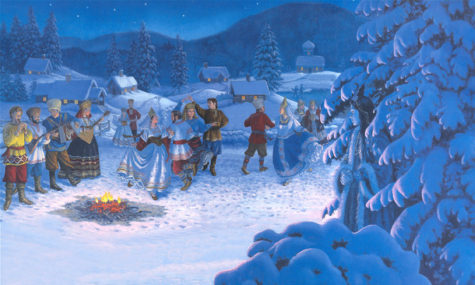
Once upon a time there lived a peasant called Ivan, and he had a wife whose name was Marie. They would have been quite happy except for one thing: they had no children to play with, and as they were now old people they did not find that watching the children of their neighbours at all made up to them for having one of their own.
One winter, which nobody living will ever forget, the snow lay so deep that it came up to the knees of even the tallest man. When it had all fallen, and the sun was shining again, the children ran out into the street to play, and the old man and his wife sat at their window and gazed at them. The children first made a sort of little terrace, and stamped it hard and firm, and then they began to make a snow woman. Ivan and Marie watched them, the while thinking about many things.
Suddenly Ivan’s face brightened, and, looking at his wife, he said, ‘Wife, why shouldn’t we make a snow woman too?’
‘Why not?’ replied Marie, who happened to be in a very good temper; ‘it might amuse us a little. But there is no use making a woman. Let us make a little snow child, and pretend it is a living one.’
‘Yes, let us do that,’ said Ivan, and he took down his cap and went into the garden with his old wife.
Then the two set to work with all their might to make a doll out of the snow. They shaped a little body and two little hands and two little feet. On top of all they placed a ball of snow, out of which the head was to be.
‘What in the world are you doing?’ asked a passer-by.
‘Can’t you guess?’ returned Ivan.
‘Making a snow-child,’ replied Marie.
They had finished the nose and the chin. Two holes were left for the eyes, and Ivan carefully shaped out the mouth. No sooner had he done so than he felt a warm breath upon his cheek. He started back in surprise and looked–and behold! the eyes of the child met his, and its lips, which were as red as raspberries, smiled at him!
‘What is it?’ cried Ivan, crossing himself. ‘Am I mad, or is the thing bewitched?’
The snow-child bent its head as if it had been really alive. It moved its little arms and its little legs in the snow that lay about it just as the living children did theirs.
‘Ah! Ivan, Ivan,’ exclaimed Marie, trembling with joy, ‘heaven has sent us a child at last!’ And she threw herself upon Snowflake (for that was the snow-child’s name) and covered her with kisses. And the loose snow fell away from Snowflake as an egg shell does from an egg, and it was a little girl whom Marie held in her arms.
‘Oh! my darling Snowflake!’ cried the old woman, and led her into the cottage.
And Snowflake grew fast; each hour as well as each day made a difference, and every day she became more and more beautiful. The old couple hardly knew how to contain themselves for joy, and thought of nothing else. The cottage was always full of village children, for they amused Snowflake, and there was nothing in the world they would not have done to amuse her. She was their doll, and they were continually inventing new dresses for her, and teaching her songs or playing with her.
Nobody knew how clever she was! She noticed everything, and could learn a lesson in a moment. Anyone would have taken her for thirteen at least! And, besides all that, she was so good and obedient; and so pretty, too! Her skin was as white as snow, her eyes as blue as forget-me-nots, and her hair was long and golden. Only her cheeks had no colour in them, but were as fair as her forehead.
So the winter went on, till at last the spring sun mounted higher in the heavens and began to warm the earth. The grass grew green in the fields, and high in the air the larks were heard singing. The village girls met and danced in a ring, singing, ‘Beautiful spring, how came you here? How came you here? Did you come on a plough, or was it a harrow?’ Only Snowflake sat quite still by the window of the cottage. Continue reading
James Cheney: Invocation To The Dark Mother
Daniel: Prayer Before The Final Battle
blessed obyno: Queen of Ghosts
blessed obyno: Queen of Ghosts
Caerlion Arthur: The Great, Bloody and Bruised Veil of the World
